



Information Literacy Competency Standards for Higher Education « Libraries and Transliteracy [tweetmeme source=”librarianbyday” only_single=false]Information Literacy Competency Standards for Higher Education from ACRL, (The Association of College and Research Libraries division of the American Library Association) includes a sections on the definition of information literacy, IL Technology, IL & higher education, IL & pedagogy, standards, assessments, performance indicators, and a practical guide for instruction librarians. I’ve included the four standards & their performance indicators below but left out the included outcomes. You can read the document online or download a pdf. Approved by the Board of Directors of the Association of College and Research Libraries on January 18, 2000, Endorsed by the American Association for Higher Education (October 1999) and the Council of Independent Colleges (February 2004) An information literate individual is able to: Standard One – The information literate student determines the nature and extent of the information needed. 1. Like this:
Guidelines Styleguide Thought someone might find this useful – it’s the styleguide we use for my library’s digital branch ! It’s a long document, broken up into these sections: General Guidelines for Blog Posts Citing/Attribution Featured Section Comments – What to do with them Creating a “Voice” How Can I Get a Conversation Started? I have a suggestion/problem. Staff Responsibilities {*style:<b> </b>*} Please follow these guidelines when writing blog posts on our public website. Post frequency/length: Frequency: 2 posts per week for each Subject Guide Posts in the Services section – as needed Length: sufficient to cover topic shorter is always better – just enough to cover the content Formatting: one space between sentences – not two! avoid ALL CAPS use a spell checker break post into small paragraphs rather than one large chunk of text Post titles: keep them short, snappy, and descriptive capitalize every word except prepositions (like a book title) Internal Post Structure: Bulleted lists are great web (lowercase) Summary of post
Tools - Guidelines and standards manuals The word 'Guidelines' is in fashion, but implies flexibility. I prefer 'Standards.' The appearance and exposure of the corporate brand must be constant. In even the most entrepreneurial corporate culture where "all permissions are granted unless expressly denied," identity must be the great exception, in which all permissions are denied unless expressly granted. Otherwise, chaos will rule. Edward Tufte says this well: "If there is a well thought-out design standard, it should be followed. Until 2000 or so, the best manuals were beautifully designed books, expensively produced to support their quality message and policy importance. Some manuals are at least partly 'open' on the Web, and I will add well-designed examples below as I (or you) find them. [Thanks to teacher Paulo Granato (e-mail) in Brazil for suggesting this page, and to URL contributors such as Hans Stol, Piotr Sierzega, Johnny Hood and Design Maven Frank Briggs.]
Draft Blog Guidelines Shamelessly cobbled together from several sources (such as LITA’s blog policy and the canonical St. Petersburg College Library Blog Policy), here’s a generic draft blog guideline. Alane, per your earlier comment, I wasn’t sure how or whether to wedge in a statement about not talking about confidential projects, which would be on the lines of OCLC not discussing products. Purpose The MPOW Libraries are providing blogs to MPOW departments to advance the … [mission/purpose/general big-sky hoo-hah; a functional statement, as opposed to “because we wanted to say we were blogging”]. Blog managers XYZ will be responsible for overall blog administration [tag, you’re it!]. Hosting Blogs are hosted at [blogs.library.MPOW.edu?] Blog Assignments For 2007, to conserve bandwidth and ensure a smooth migration to this new service, one blog will be assigned on request to each department at MPOW Libraries. Acceptable Use MPOW Libraries reserve the right not to post any blog post, or to later remove it. Pages